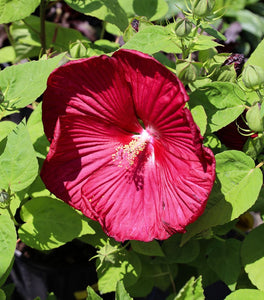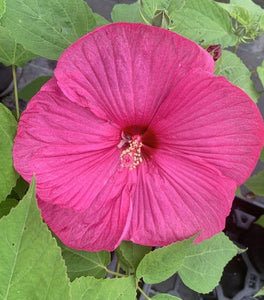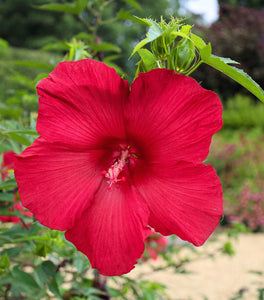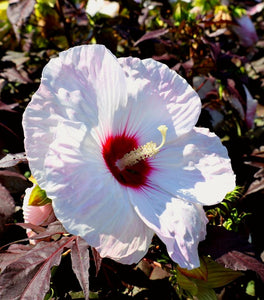Images Depict Mature Plants
Hibiscus Luna White for Sale Online
Hibiscus Luna White perennials are compact and well-branched shrubs that are well known for their beautiful blossoms. Their large flowers are snow-white with ruby-red centers and produce creamy white stamens. Your Hibiscus will bloom these flowers continuously from mid to late summer, and even though each flower will last only one or two days, they will continue to produce more and more as their growing season progresses. This plant's foliage compliments the flowers with its dark green color.
Hibiscus Luna White plants grow best in full sun, average to medium wet soil, and are drought-tolerant. Plant your perennial in a shrub border for dramatic summer blooms or along streams or ponds. Because this plant is compact, you can also plant it in a large container and place it on your patio or deck.
| Hardiness Zone: | 5-9 |
|---|---|
| Mature Height: | 3 to 3.5 feet |
| Mature Width: | 2 to 3 feet |
| Classification: | Perennial |
| Sunlight: | Full Sun |
| Habit: | Upright, compact |
| Flower Color: | White with ruby-red center, 6 to 8 inches across |
| Flowering Season: | July to September |
| Foliage: | Green |
| Soil Condition: | Prefers evenly moist soil |
| Water Requirement: | Water well until established. |
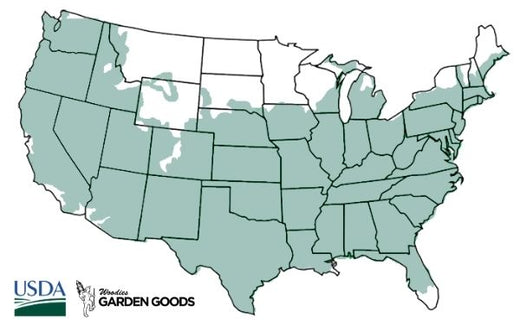
How to Care for Hibiscus Luna White
Be sure to read our planting instructions to ensure a healthy and happy plant for years to come!

How Much Sun Does my Hibiscus Luna White Plant Need?
Hardy Hibiscus perennials thrive in full sunlight; they will grow in partial shade, but not as well. If your plant is grown in partial shade, its flowers will not blossom as big as they would in full sunlight conditions. However, if you live in an area with extremely hot summers, your plant will benefit from some midday shade. Midday sunlight can be too bright and dry out your plants quicker than they would typically, so shaded time will give your plants a break from too much heat exposure.

What Kind of Soil Do Hibiscus Plants Prefer?
Hibiscus Luna White perennials prefer to be in organically rich, well-draining soil conditions. They also thrive in acidic soil with peat moss or potting soil mixed in the garden soil. If the soil in your garden is mostly clay, consider planting your Hibiscus in a raised bed to help prevent water build-up. Also, make sure your plant's soil conditions are always moist. This perennial does not thrive or grow well in dry soil. Well-draining soil will help avoid any risk of root rot disease.
How Often Should I Water my Hibiscus Luna White Plants?
Hardy Hibiscus Luna White plants thrive in moist soil conditions. If your plant's soil does not receive enough water, its foliage will drop and die. However, if this happens, do not worry; your plant will perk back up as soon as it receives enough water. The key to keeping your plant's soil evenly moist but not too soggy is well-draining soil. If your plant's soil conditions are too wet, it could cause root rot disease. This disease happens when your plant receives water, but the soil is not well-draining, and any excess water sits at the roots and causes them to rot.

When Should I Prune my Hibiscus Luna White Plants?
When you notice your Hibiscus Luna White flowers become brown or unattractive, including the seed pods, it is time to prune them off. This process is called deadheading, and it encourages your Hibiscus to produce new flowers and keep them attractive throughout its growing season. Remove any brown stems or leaves to give your plant a healthier and more attractive appearance. After your perennial has finished flowering, cut it back about 6 inches above the ground. In colder climates, cut your plant back right before the first snowfall. In warmer areas, cut your Hibiscus shrub back in the spring just before it beings to bud.











